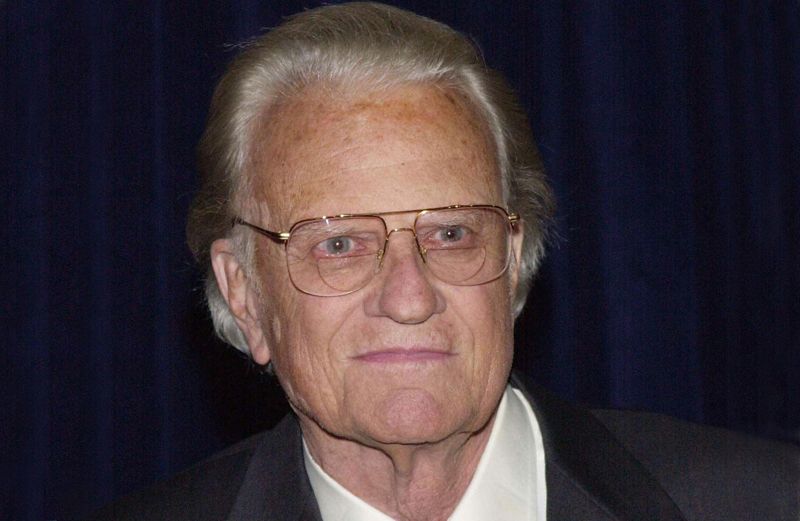The following interview with the Reverend Billy Graham first appeared in the November 1977 issue of Guideposts.
When plans were being made here at Guideposts to offer Billy Graham’s new best-seller How to Be Born Again as a book selection to our subscribers, one of our editors said pensively, “All across America, many people will respond to the message in this book. But some will not. I wonder what Billy Graham would say about the mental roadblocks or emotional barriers that hold such people back?”
“Why don’t we go and ask him?” another editor suggested. And so not long after that we sat on the terrace of the Grahams’ North Carolina home.
Guideposts: Dr. Graham, in your new book you outline certain steps that must be taken if a person wishes to be “born again.” Do you think there are some mental attitudes or other conditions that make it difficult or even impossible for a person to take those steps?
Billy Graham: Yes, I’m sure there are.
Guideposts: Could you tell us about some of the major ones, please?
Billy Graham: Well, one of the first that comes to mind might be called intellectualism, the tendency to approach Christianity only from the rational point of view. I think there are sincere people who have intellectual problems with the whole idea of a God-man who lived two thousand years ago, died at the age of thirty-three, rose from the dead, and is our only way to salvation.
To the purely rational mind the whole thing is–well, it’s much like what St. Paul wrote to the church at Corinth–it all seems like foolishness. Paul even used a word which is the one we derive our modern word ‘moron’ from. He said that Christianity can seem moronic to some people, because when man sinned against God in the beginning, man’s intellect was affected. A veil is drawn over the eyes of people who refuse to “become as little children,” and only the Holy Spirit can lift it. That’s where the work of the Holy Spirit in salvation comes in.
Guideposts: Can you give us an illustration of how this block can be lifted?
Billy Graham: Yes, of course. I remember the case of a man named Fred Smith, one of the greatest biochemists in the world. He was an Englishman who was brought over to this country by the University of Minnesota to do cancer research. Fred Smith was an avowed agnostic. He couldn’t accept Christianity intellectually or any other way.
Now, Fred Smith had an American neighbor who was a devout Christian. They met each other, liked each other, became good friends. One day an evangelistic crusade came to the big stadium in Minneapolis, and the neighbor asked Smith if he’d like to go. At first he refused. “I was reared in the Church of England,” he said, “and I’ve studied Christianity. I’ve rejected it, and I don’t even want to think about it.”
But the neighbor was rather persistent, and finally Smith agreed to go with him just once. So they went, and Smith was very impatient and scornful. On the way home, he said he didn’t like the music; it was corny. He said that he didn’t like the preaching; it wasn’t logical. “The whole evening was a waste of time,” he said. “I didn’t get a thing out of it.”
But that night for some strange reason, before he went to bed, Fred Smith remembered a verse of Scripture that had been quoted: “If thou shalt confess with thy mouth the Lord Jesus Christ and believe in thy heart that God raised Him from the dead, thou shalt be saved.” (Romans 10:9) That’s a rather long Scripture to remember, but he remembered it word for word.
All that night and all the next day in his classes that passage kept echoing through his mind. He came home and thought about it that night. He talked to his wife about it. On the third night, without ever going back to the crusade, he got down on his knees and said, “God, I know there must be a Supreme Being. If this is Your way of salvation, I accept it. I accept Jesus Christ.”
Fred Smith began to study the Bible as if it were a text book. He grew in spiritual stature very rapidly. He and his wife became tremendous Christians. What I’m showing you is that God can take a passage of Scripture and reach the intellectual mind. The Holy Spirit lifted the veil from Fred Smith’s mind. The preaching at the crusade that night didn’t have to be clever, or argumentative, or even logical. Something was supernaturally done by the Spirit of God on the mind and in the heart of Doctor Fred Smith.
Guideposts: There are certainly many such success stories. But what do we say to men and women to whom these revelations don’t occur?
Billy Graham: Well, I think that we witness to them, but we have to realize that the true communicator of the Gospel is the Holy Spirit. When I stand before a group of people, a small group in a classroom or thousands in a big stadium, I have a terrible feeling of helplessness. I know that I don’t have the ability to really to win those people to Christ. But I also know that I’ve got another standing beside me who will do the winning if I’m faithful in my witness.
When the Gospel is presented, some people will respond and some won’t. It seems at times that you could almost have identical twins standing side by side, one accepting and one rejecting. It’s like the sun that melts the butter and hardens the clay. This is a mystery that I don’t understand; it’s part of the sovereignty of God. But I do know that when we faithfully proclaim the Gospel, his word will not return void. It accomplishes what God wants it to.
Guideposts: The seed is sown, and some falls on fertile ground.
Billy Graham: That’s right. Our job is to faithfully proclaim, to pray, to sow the seed, and that seed may germinate in many ways. I remember the Surgeon General of Portugal telling me how one day he looked down and noticed a piece of paper stuck to his shoe. When he pulled it off, he saw it was part of a Gospel tract. Well, through that fragment of paper he accepted Christ and became a real evangelical leader in Portugal.
Now, somebody had printed that tract, somebody had handed it out, never dreaming that it would win the Surgeon General of Portugal to Christ. And so we never know, when the Word is spread, what it’s going to accomplish.
Guideposts: Are there certain blocks in people’s lives or actions that must be removed before such events can transpire?
Billy Graham: Well, there’s a block that I see in people all the time that is far greater than the intellectual block. It’s the unwillingness of people to commit themselves to the high moral demands of Christ. This is the most common block of all people, who just cannot say to Christ, “You will be Lord of all in my life, and I will stop doing anything that I know You would not want me to do.”
Guideposts: Do you meet such people often?
Billy Graham: Yes, all the time. Just the other day a well-known person came to me deeply troubled, ready to accept Christ, but unwilling to give up the woman he was living with who was not his wife. He was a married man. He said to me, “I have tried. I have prayed. I have wept. But I just can’t let her go.”
I said to him, “Well, this is your great test. You have to be willing to repent of that sin. And repentance means ‘turning away from.’ In a very small way, I can understand the struggle you’re going through, because when I first came to Christ I was going with a girl who was not a Christian, and she was unwilling to become one. I was very much in love with her, or so I thought, but the Lord seemed to be telling me that this was my big test–was I willing to give the girl up, or was I not?
I remember the night I went over and told her that we had to stop seeing each other. We’d been going together for three years, and I’m sure we both had intended to be married. And I remember that when I drove home that night, about ten miles, I wept all the way. But I was doing it for Christ. Of course, I didn’t realize then that the Lord had somebody else in mind who would turn out to be the ideal wife for me.
Guideposts: Is the problem of sexual immorality very prevalent, then?
Billy Graham: I’d say that is the one that comes to my attention the most often as a force holding people back in their spiritual lives. They’re not willing to surrender that area to Christ, especially in our promiscuous society where sex is exploited everywhere, on television, on newsstands. If I were eighteen or twenty again, I’m sure that without God’s direct intervention I would not be able to resist, because temptations are flung out in front of young people today in a way we didn’t know in my generation.
Guideposts: You’re really saying that people flinch from making a total commitment, is that right?
Billy Graham: Yes, that’s right. Someone has said that this is the age of uncommitment. There seems to be no great challenge in this country today. People are just apathetic, interested in their own pleasures, not committed to any cause. And the cause I’m talking about is Jesus Christ. Some people are not willing to say, “I’ll burn all my bridges behind me and surrender totally–my will, my mind, my heart, my family, my business or whatever–all my goals to Jesus Christ.
And that is what Christ asks of us: to burn our bridges behind us and say, “Christ, You and You alone are the One I’m going to depend on for my eternal salvation and for my daily personal relationships. You come before everything, and I don’t do anything without asking Your guidance and help.”
Guideposts: Perhaps one reason that some people don’t do this is because they don’t feel the need for such a commitment. They say, “I try to be a caring, compassionate person. I try to aid my community and pull my weight in society. I’m not unhappy the way I am and I don’t feel any tremendous vacuum, so why should I make this revolutionary leap, this total commitment?” What is your answer to such people?
Billy Graham: In my experience, people who talk like that are usually middle-aged. Young people aren’t so complacent; they have too many hang-ups to be smug about themselves. But complacency is indeed a block with older people, and a difficult one to overcome. Sometimes these people go to church and live fairly respectable lives and are quite pleased with themselves. What is lacking, very often, is a consciousness or conviction of sinfulness.
If my own salvation depended even five per cent on Billy Graham, I would have serious doubts as to my salvation, because I know I am a sinner. I know there are sins of omission in my life every day. There are sins of commission. God demands perfection of us. He said, “Be ye holy, as I am holy.” But I can’t be holy. Not compared to God’s holiness. Oh, perhaps I can be holy in contrast to some of my fellow men. But not in comparison with God.
It’s like a housewife who washes her clothes and hangs them up in the yard to dry. And then a snowfall comes, and when it does the whitest sheet she has on her line looks gray and dingy in comparison to the snow. That’s the way these complacent people really are in comparison to the holiness of God, which is absolute purity. I’ve had many people in this category finally accept Christ, but many more in this category reject Him.
Guideposts: What can be done to shake the smugness out of such people?
Billy Graham: Sometimes it takes a tragedy or a near tragedy in their lives to wake them up. A serious illness, perhaps, or a narrow escape, or the death of a loved one. Sometimes it’s an awareness of the approach of the end of their own lives.
Just the other day a lawyer, a Christian herself, asked if she could bring her eighty-five-year-old father to see me. Now, he was in the exact category we’re talking about–had been all his life. I said to him, “Mr. So-and-so, do you really know Jesus Christ as your savior? Are you certain that if you died right now you’d go to Heaven?”
He said that just the week before, watching me on television, he had made a decision and had come forward in his heart. “Well,” I said, “that’s fine. But are you willing to bow your head right now, and pray, and make it definite?” He did, and the tears rolled down his cheeks. Why? Because he knew that he was getting near the end of the road and that time was running short.
Guideposts: What are some of the other external factors that hold people back?
Billy Graham: I’d say that another very common block is plain, everyday procrastination. People put off making decisions. Accepting Christ is the biggest decision of all, but they put that off, too. They say to themselves, “Well, I’ve got plenty of time. I’ll think about it next month or next year. There’s no hurry.” But often there is a hurry. Life is a fragile thing. None of us know when it may end for us.
My son-in-law was telling me just the other day about a couple he knew very well. The wife was a Christian; the husband was not. Oh, he showed signs of wanting to be, but he just kept putting it off.
One night the wife awoke out of a sound sleep with the conviction that she ought to talk to her husband about this hesitancy of his. She woke him up and talked to him so lovingly and earnestly that finally they prayed together and he did indeed accept the Lord. Then he went back to sleep–and he never woke up.
He just died in his sleep. It was as close as that. A matter of hours, or maybe minutes. I could tell you many such stories of people who hesitated until it was too late and others who made their decision literally in the nick of time.
So you see, there are all sorts of roadblocks: intellectualism, immorality, unwillingness to make a commitment, complacency, procrastination … those are the ones I’ve mentioned and there are probably others. If we had all the answers, everybody would be saved, but they’re not saved.
Still, I know that when I’ve done the best I can and move on, the Holy Spirit stays behind, and I know He will carry on after I’ve left. That’s what we have to put our trust in where salvation is concerned: the work of the Holy Spirit.
That’s what it all comes down to in the end.
For more inspiring stories, subscribe to Guideposts magazine.






